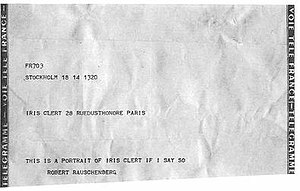Iris Clert
Iris Clert | |
|---|---|
 Iris Clert posing atop le Plein | |
| Born | c. 1917 Athens |
| Died | 1986 Cannes |
| Occupation | Gallery owner, curator, socialite |
Iris Clert (Greek: Ίρις Αθανασιάδη; 1917 – 1986[1]) was the owner of the Galerie Iris Clert from 1955 to 1971. During its tenure, her gallery became an avant-garde hotspot in the international art scene, particularly to Yves Klein, Jean Tinguely and Arman.
Originally of Greek nationality, Clert became an overnight socialite with the success of her gallery.
Clert was active in the French Resistance during the Second World War.

Portrait of Iris Clert by Shunk-Kender © Roy Lichtenstein Foundation
In 1961, Robert Rauschenberg, who would become one of the forerunners of the Neo-Dada movement, was invited to participate in an exhibition at the Galerie, in which the artists were to create and display a portrait of Iris Clert. Rauschenberg proceeded to send a telegram to the Galerie, containing the words "This is a portrait of Iris Clert if I say so/ Robert Rauschenberg". This was a significant move for Rauschenberg and the artistic community, signifying a step away from the Dadaist work of Marcel Duchamp and Jasper Johns - which tended to focus on the role of the observer in applying meaning to a work of art - and toward a more active role of the creator in defining art's meaning.
In 1978 Clert published her autobiography titled Iris-time : l'artventure.[2]
References
^ Luxembourg & Dayan (2015). "Microsalon: An Homage to Iris Clert". Frieze Masters. Luxembourg & Dayan. Retrieved 3 July 2016..mw-parser-output cite.citation{font-style:inherit}.mw-parser-output q{quotes:"""""""'""'"}.mw-parser-output code.cs1-code{color:inherit;background:inherit;border:inherit;padding:inherit}.mw-parser-output .cs1-lock-free a{background:url("//upload.wikimedia.org/wikipedia/commons/thumb/6/65/Lock-green.svg/9px-Lock-green.svg.png")no-repeat;background-position:right .1em center}.mw-parser-output .cs1-lock-limited a,.mw-parser-output .cs1-lock-registration a{background:url("//upload.wikimedia.org/wikipedia/commons/thumb/d/d6/Lock-gray-alt-2.svg/9px-Lock-gray-alt-2.svg.png")no-repeat;background-position:right .1em center}.mw-parser-output .cs1-lock-subscription a{background:url("//upload.wikimedia.org/wikipedia/commons/thumb/a/aa/Lock-red-alt-2.svg/9px-Lock-red-alt-2.svg.png")no-repeat;background-position:right .1em center}.mw-parser-output .cs1-subscription,.mw-parser-output .cs1-registration{color:#555}.mw-parser-output .cs1-subscription span,.mw-parser-output .cs1-registration span{border-bottom:1px dotted;cursor:help}.mw-parser-output .cs1-hidden-error{display:none;font-size:100%}.mw-parser-output .cs1-visible-error{font-size:100%}.mw-parser-output .cs1-subscription,.mw-parser-output .cs1-registration,.mw-parser-output .cs1-format{font-size:95%}.mw-parser-output .cs1-kern-left,.mw-parser-output .cs1-kern-wl-left{padding-left:0.2em}.mw-parser-output .cs1-kern-right,.mw-parser-output .cs1-kern-wl-right{padding-right:0.2em}
^ Clert, Iris (1978). Iris-time: l'artventure. Paris: Denoël.
The Formidable Blue Stamp of Yves Klein by John Held Jr.
Further reading
Clert, Iris (1978). Iris-time: l'artventure. Paris: Denoël. http://www.worldcat.org/oclc/461682254